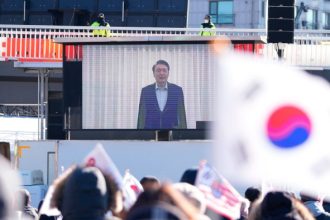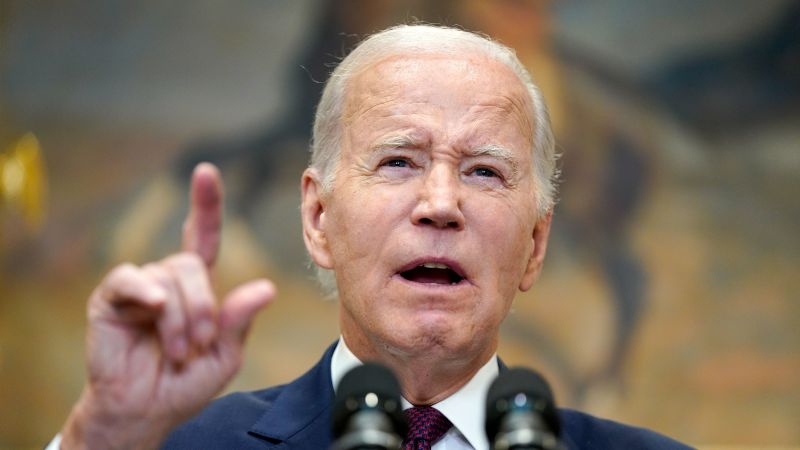A federal judge’s order Tuesday prohibiting various Biden administration agencies and officials from communicating with social media companies about certain content thrust an under-the-radar lawsuit into the national spotlight.
The preliminary injunction issued by US District Judge Terry Doughty in Louisiana ordered a slew of federal agencies and more than a dozen top officials not to communicate with social media companies about taking down “content containing protected free speech” that’s posted on the platforms.
On Wednesday, the administration notified the court that it plans to appeal the order.
The order is part of a lawsuit brought by the Missouri and Louisiana attorneys general in 2022 that accuses the Biden administration of effectively silencing conservatives by pressuring the private social media companies in its effort to moderate online misinformation about Covid-19.
Though Doughty hasn’t yet ruled on the merits of the two states’ claims, the injunction represents their most significant victory yet in the ongoing lawsuit.
Legal experts say that the order is overly broad and scholars on online misinformation warned that it could have a chilling effect on the government’s efforts to curtail lies about public health emergencies and elections.
Here’s what to know about Tuesday’s order.
Doughty, an appointee of former President Donald Trump, outlined 10 actions that agencies and officials are prohibited from taking, including “specifically flagging content or posts on social-media platforms and/or forwarding such to social-media companies urging, encouraging, pressuring, or inducing in any manner for removal, deletion, suppression, or reduction of content containing protected free speech.”
The order applies to communication with social media companies that “include Facebook/Meta, Twitter, YouTube/Google, WhatsApp, Instagram, WeChat, TikTok,” as well as a number of other online platforms.
The injunction, however, says that the government can still communicate with the companies as part of efforts to curb illegal activity, address national security threats and combat voter suppression and foreign attempts to influence elections.
The agencies and officials the order applies to include the Department of Health and Human Services, the National Institute of Allergy and Infectious Diseases, the US Centers for Disease Control and Prevention, the Justice Department and the FBI.
It also applies to more than a dozen top administration official, such as US Surgeon General Vivek Murthy, White House press secretary Karine Jean-Pierre and Homeland Security Secretary Alejandro Mayorkas.
In a 155-page memo supporting his order, Doughty said the plaintiffs in the case “are likely to succeed on the merits in establishing that the Government has used its power to silence the opposition.”
“Opposition to COVID-19 vaccines; opposition to COVID-19 masking and lockdowns; opposition to the lab-leak theory of COVID-19; opposition to the validity of the 2020 election … is a perfect example of viewpoint discrimination of political speech,” he wrote. “American citizens have the right to engage in free debate about the significant issues affecting the country.”
And in an extraordinary comparison to George Orwell’s novel “1984,” Doughty invoked the book when he said “the evidence produced thus far depicts an almost dystopian scenario.”
“During the COVID-19 pandemic, a period perhaps best characterized by widespread doubt and uncertainty, the United States Government seems to have assumed a role similar to an Orwellian ‘Ministry of Truth,’” he wrote, adding in a footnote that the fictional agency is “responsible for altering historical records and disseminating propaganda to manipulate and control public perception.”
A White House official on Tuesday defended the administration’s efforts to combat online misinformation, saying the government “has promoted responsible actions to protect public health, safety, and security when confronted by challenges like a deadly pandemic and foreign attacks on our elections.”
“Our consistent view remains that social media platforms have a critical responsibility to take account of the effects their platforms are having on the American people, but make independent choices about the information they present,” the official said.
Meta declined to comment. CNN also reached out to Twitter, Google and TikTok for comment.
The federal government has coordinated over the years with social media companies to help combat crime, but the coordination evolved in recent years as the government sought to rid the internet of misinformation and disinformation about the Covid-19 pandemic and elections.
The ruling “reflects, I think, a lot of concern, particularly on the right and among conservative judges, about the constitutional implications, the free speech implications, of too much government pressure, too much government interaction,” said Genevieve Lakier, a professor at the University of Chicago Law school.
Ethan Porter, an expert on online misinformation, said the ruling’s effects may be felt in future years, as opposed to an immediate impact.
“Over the longer term, you can imagine future administrations being somewhat more hesitant to engage with social media companies when the next pandemic emerges, as it inevitably will,” Porter said. “And that’s troubling, because I think there’s good reason to suspect that people’s responses to Covid-19 are in some way shaped by misinformation.”
“Today’s historic ruling is a big step in the continued fight to prohibit our government from unconstitutional censorship,” Louisiana GOP Attorney General Jeff Landry said in a statement Tuesday. “We look forward to continuing to litigate the case and will vigorously defend the injunction on appeal.”
Experts told CNN that the preliminary injunction is too broad and raises novel legal questions, making it ripe for the DOJ’s appeal to the 5th US Circuit Court of Appeals, which is arguably the most conservative appeals court in the nation.
Still, they said that even the appeals court might rein in the order if it feels the injunction is too wide-reaching.
“This is why I think we don’t exactly know what (the order) means because it seems very unlikely to me that even the Fifth Circuit is going to affirm this ruling in its totality. It’s so broad, so unnuanced, that that seems very unlikely because it’s going to immediately stop … regular contacts between government officials and the platforms,” said Lakier, who is also an expert on free speech and social media platforms.
Lakier said that similar cases concerning the First Amendment and government efforts to jawbone companies have not made it very far, making Doughty’s order especially unique.
“The opinion is really extraordinary in that it’s departing like 180 degrees from the very skeptical view of these First Amendment questions that the other courts have taken – district courts and in some cases, courts of appeal in these cases,” she said. “And so we now have a live disagreement.”
Boston College Law School professor Kent Greenfield similarly noted that Doughty’s order was unusual, telling CNN that it was unclear to him where “the likelihood of success will be ultimately” given the conservative tilt of both the 5th Circuit and the Supreme Court, if an appeal eventually made it to the nation’s highest court.
“But I do think, if applying routine, mainstream First Amendment notions and First Amendment principles, this is not a suit that I would expect to be successful,” he said.
Read the full article here





